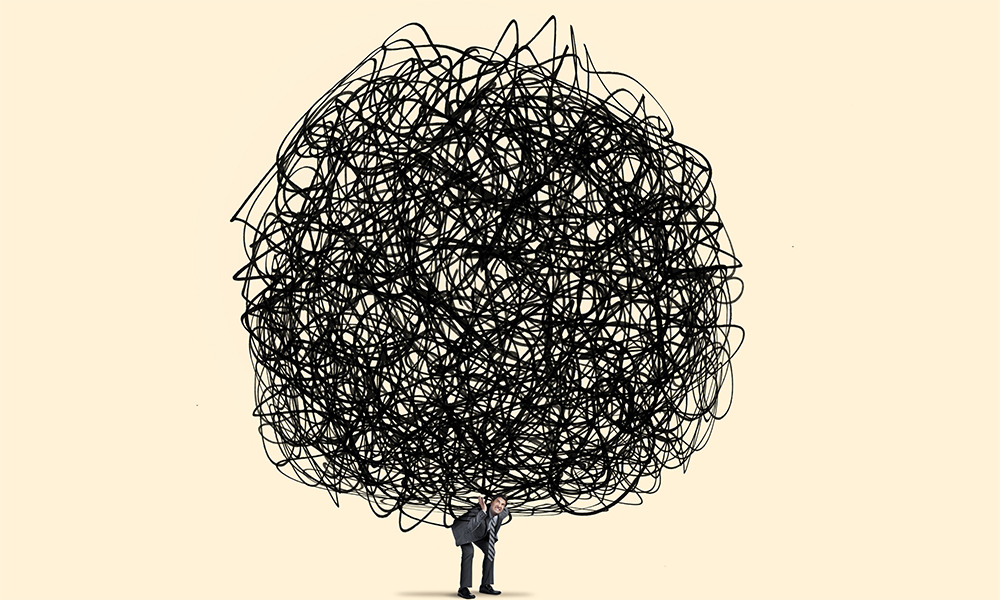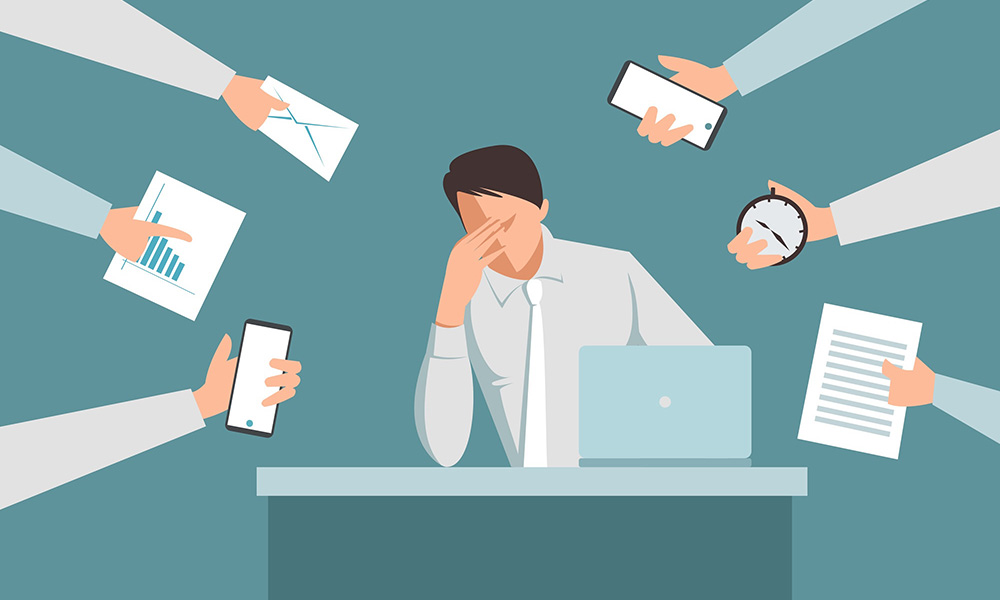Do you feel that your priorities get pushed aside in the daily whirlwind at work? Do your days, weeks, months pass by in a rush of busyness – but somehow you don’t move any closer to your long-term goals? Does your to-do list grow longer and longer, despite “tried-and-tested” productivity techniques and apps?
If yes, take comfort in the fact that you’re not alone. Across the world, professionals are struggling to manage their workload effectively – trying to be more efficient and make best use of their limited time. However, in spite of trying different tools and techniques, time management does not seem to be working for many of us. So, this week, my message focuses on the need to look at attention management.
Traditional time management techniques were created for a different world. Twenty years ago, it was possible to block time for important tasks, close the office door, and simply get things done. Today, however, we live amid incessant distractions – some external, some internal. Technology is the most invasive of all, with every “ping!” taking our attention away from the task at hand. In fact, our minds have become so conditioned to expect regular disruption that, even if there are no updates, we still feel compelled to check our devices every few minutes! So, ironically, allocating time to a task no longer means it will receive your undivided focus.
Moreover, with portable Internet-connected devices, it’s now possible to work anywhere, anytime – while commuting, at home, on vacation, etc. Our concentration is increasingly scattered as we try to accomplish multiple things at the same time, jumping from one activity to another.
Changes in the way we work have brought additional problems: open-plan workplaces create a great energy, but also lead to more interruptions from co-workers. Remote work gives us flexibility, but working at home or the local coffee shop has its own distractions. Being part of a knowledge economy also presents new challenges. In her Harvard Business Review article, Time Management Training Doesn’t Work, productivity expert Maura Thomas explains:
Knowledge workers are so overwhelmed by incoming information, they spend much of their time “playing defense,” operating without a clear picture of their total responsibilities. Work comes at them from half a dozen places all at once, so they get quickly overwhelmed trying to remember it all. The pace is frantic…. The “time management” techniques they learned in the past are failing them: there are too many sticky notes, the paper lists are way too long and there’s always more to add to them….
The promise of time management is that it’s possible to bring everything under control, to check off each item on your to-do list. But the truth is that’s impossible in today’s workplace. The flow of tasks is endless – there will never be enough hours for you to do everything.
As British historian C. Northcote Parkinson put it, “Work expands to fill the time available for its completion.” Plus, ironically, watching the clock actually hinders your efficiency, as you get self-conscious and stressed about wasting precious hours.
What this all comes down to is a working life that’s reactive, rather than intentional. Your time and attention are hijacked by hundreds of things, which are unrelated to your core responsibilities and aspirations.
In order to take charge of your workdays, it’s time to manage your attention and not just your time. In another Harvard Business Review piece, To Control Your Life, Control What You Pay Attention To, Thomas defines this approach:
Attention management is the practice of controlling distractions, being present in the moment, finding flow, and maximizing focus, so that you can unleash your genius…. It is the ability to recognize when your attention is being stolen (or has the potential to be stolen) and to instead keep it focused on the activities you choose.
By reserving your attention for the projects and people that really matter, you can boost personal productivity as well as bring meaning into your professional life. This approach also helps you move from distraction to “flow” – a state of energised focus, full involvement, and joy in the activity.
Here are seven ways you can try to better manage your attention:
1. Get comfortable with choices
Traditional time management gives the illusion that, if only you’re disciplined enough and use the right tools, you can fit everything into your schedule. But the demands of the twenty-first century workplace are limitless – which means you must choose what’s worthy of your attention.
Stop taking on every project or request that comes your way. Ask yourself the tough questions: Do I really want to do this? Is it aligned with my long-term goals? Do I have the necessary bandwidth? Would I rather be doing something else? Learn to prioritise and say “no” to some things – so you can devote your mental energy to work you genuinely find meaningful. In Why time management is ruining our lives, Oliver Burkeman advises:
…try to get more comfortable with not being as efficient as possible – with declining certain opportunities, disappointing certain people, and letting certain tasks go undone. Plenty of unpleasant chores are essential to survival. But others are not – we have just been conditioned to assume that they are.
2. Unplug from technology
It may not be possible for you to actually switch off your devices, but you can definitely take measures to stop them from derailing your attention constantly. For example, turn off push notifications while you’re working on an important task. If possible, put your phone on silent and keep it out of sight. In the article mentioned above, Thomas also recommends spending some technology-free time each day. Start with 15 minutes at a stretch, then work your way up to an hour or more.
3. Set boundaries
Whether you’re working at the office or from home, it’s important to set some boundaries. For instance, put on headphones or close the door as a sign that you’re in “do not disturb” mode – convey this to co-workers and family members. As a team, too, you can come up with guidelines to nurture attention. For example, designate a specific hour for “deep work” every day. During this time, no meetings/calls are to be scheduled and team members agree not to interrupt one another.
4. Learn to single-task
Multi-tasking is a huge drain on your mental energy, so practice single-tasking. If you’re working on a document, close all the other windows on your computer. If you’re having dinner with family or friends, put your phone away. If you’re conversing with a team member, stop checking your email alongside. By focusing on one thing at a time, you bring your full attention to the present moment – which makes each experience more productive as well as more rewarding.
5. Curb mental wanderings
Thomas identifies one of the biggest internal attention-stealers of our age – the temptation to “do it now”. With easy access to the world’s knowledge, you feel compelled to instantly look up the answers to any questions that strike you. This usually sends you down an Internet rabbit hole (sometimes for hours!). Similarly, when you think of a small task – like forwarding an email or making a change in your presentation – you feel the need to do it right away, worried that you might forget later.
To keep your mind focused as you work, Thomas recommends keeping a notepad at your side. When something comes to mind, simply jot it down and go back to your main task. Once it’s done, you can come back to the items on this list.
6. Protect personal time
Not only is pure, uninterrupted downtime key to your professional productivity, but also integral to your health and happiness. Just because you can send emails at 10 PM doesn’t mean you should. Be intentional about leaving the office behind when the workday is over. Instead, give your valuable attention to friends and family and leisure activities – or just yourself. Here, too, it’s important to choose the people and pastimes that re-energise and fulfil you.
7. Provide role clarity
As a leader, you can help your team members utilise their attention in an optimal way. One way to do this is to offer clarity on their roles – not just tasks. When people are clear on their larger responsibilities and how they fit into the overall mission of the organisation, they can prioritise wisely, instead of getting swept up in seemingly-urgent activities that are ultimately irrelevant.
Attention management goes beyond increasing efficiency – it offers a path to a more intentional, meaningful life. As Thomas puts it:
Better attention management leads to improved productivity, but it’s about much more than checking things off a to-do list. The ultimate result is the ability to create a life of choice, around things that are important to you. It’s more than just exercising focus. It’s about taking back control over your time and your priorities.
As always, I look forward to your thoughts.
Vivek








Comments